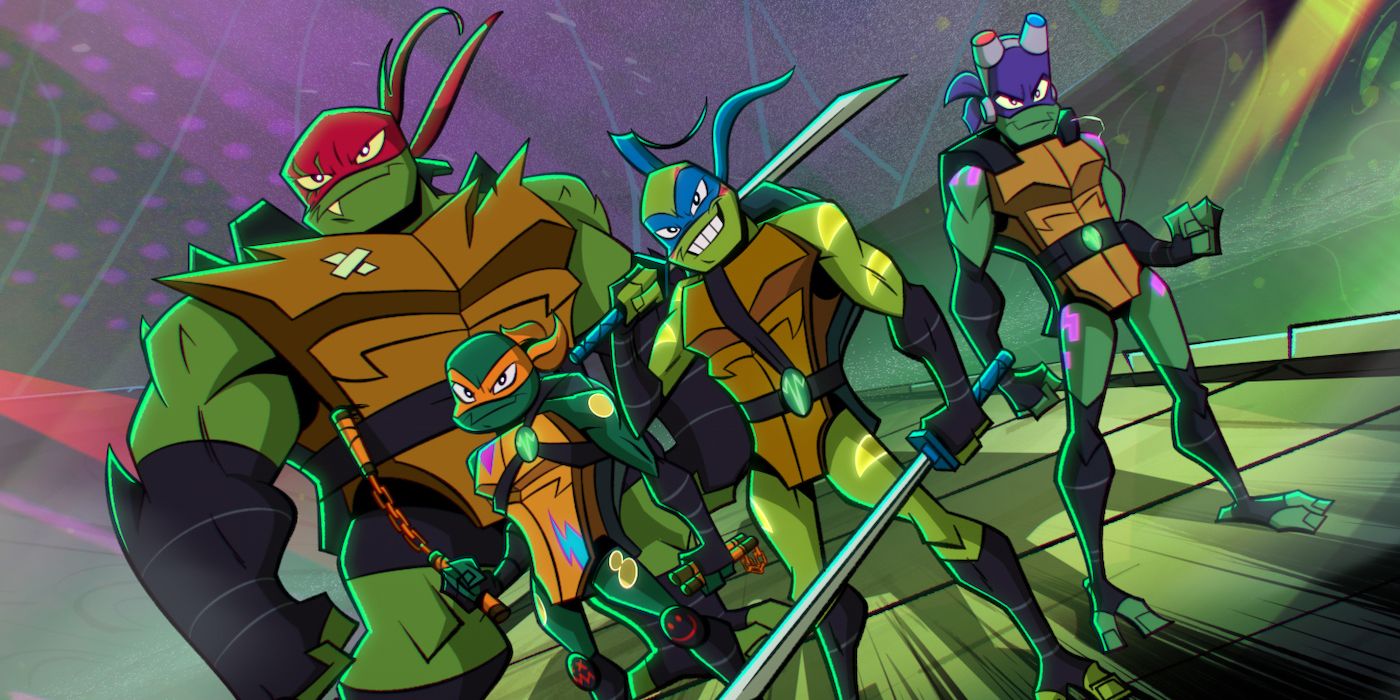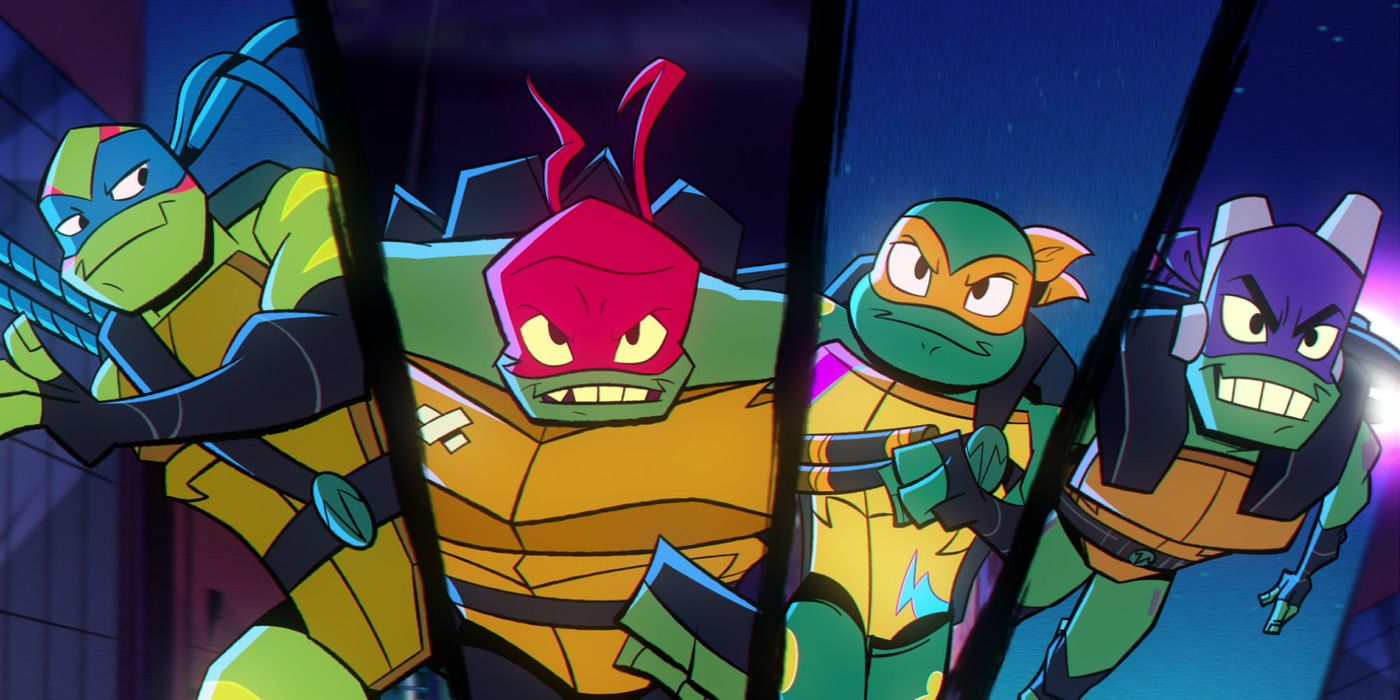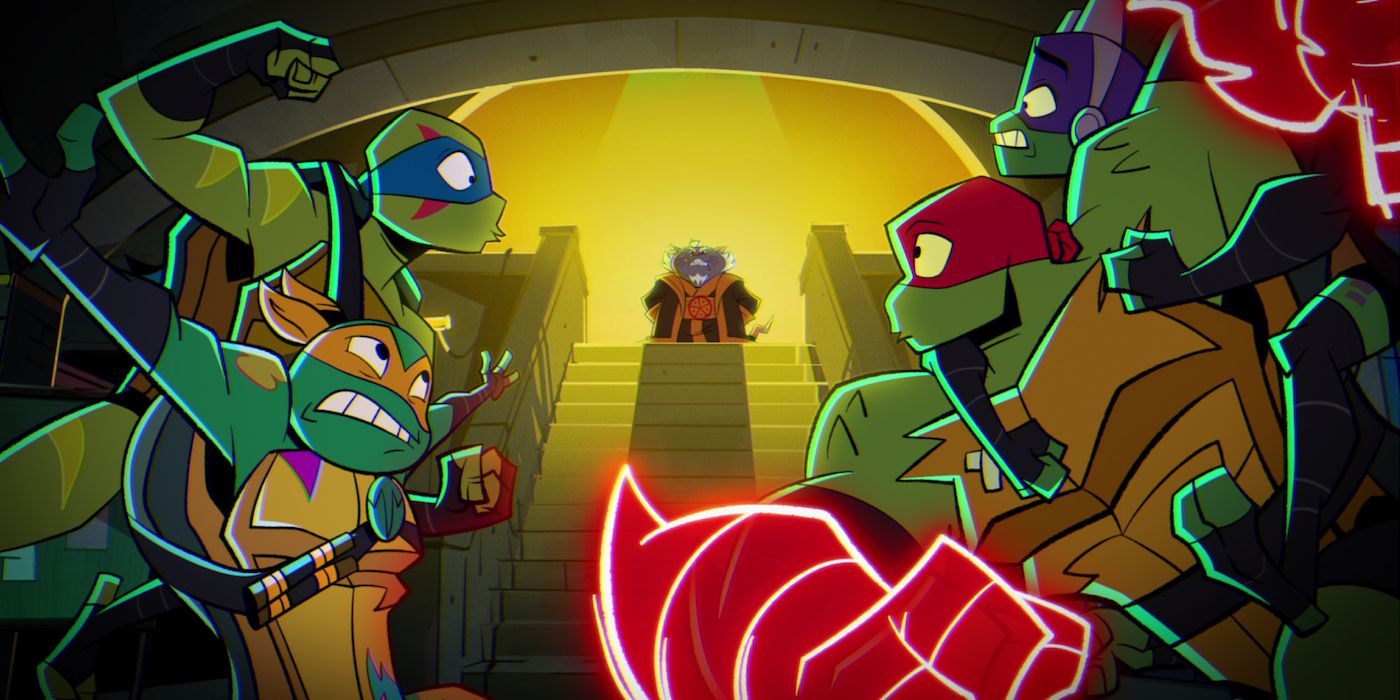During a certain critical moment in Rise of the Teenage Mutant Ninja Turtles: The Movie, Master Splinter (voiced by Eric Bauza) shouts with indignation: “Where is character development?!” It seems ironic that, in a movie with countless opportunities to use meta-humor, this is one of the jokes that made it into the final cut. It makes one wonder if the duo of directors Andy Suriano and Ant Ward realized that this was going to go through viewers’ heads. In any case, Master Splinter voiced my exact frustrations with the new movie, and this is its biggest problem.
Based on the excellent Nickelodeon series Rise of the Teenage Mutant Ninja Turtles, the movie centers around turtle siblings Leo (Ben Schwartz), Raph (Omar Benson Miller), Mikey (Brandon Mychal Smith), and Donnie (Josh Brener), as well as their best friend April (Kat Graham). The group is surprised by a visit from Casey (Haley Joel Osment), a boy who comes from the future to announce that the Turtles themselves sent him to prevent the world’s demise after the alien race Krang invades and takes over Earth.
One of the best qualities of the Rise of the Teenage Mutant Ninja Turtles TV series is that its 11-minute episodes allowed for fast-paced stories in which jokes were thrown in at lightning speed, to the point that sometimes you could miss a witty remark because you were laughing at the previous one. Of course, it’s understandable that the shift in format to a 90-minute movie would force screenwriters Tony Gama-Lobo and Rebecca May to change the pace and dynamics of the Turtles. Unfortunately, though, Gama-Lobo and May end up watering down the personalities of the four protagonists, whose short attention span and tendency to make jokes at inappropriate moments made the series a lot of fun.
It’s not that Rise of the Teenage Mutant Ninja Turtles: The Movie doesn’t have jokes. The problem is, in this version, they go for the obvious puns and the funny moments are more spaced out, in order to bring together a slightly more serious story. That would be great if the stakes felt high, and we could connect to the characters, which just doesn’t happen. From the get-go, the movie makes it clear what redemption character arc it’s going for, and any viewer can map out what’s going to happen to Raph throughout the story. But what harms the movie the most is that it decides this is the only arc worth telling.
Throughout the movie’s entire run, the other three turtles, April, Master Splinter, and even future Casey serve only as a backdrop to Raph’s drama, with nothing going on in other personal developments. One could argue that we don’t really need character development for the main players because we know them well enough, but even if that was the case, this doesn’t explain what the movie does to Casey. Aside from never really exploring the guy’s bond with the Turtles (we’re just expected to accept he has a deep connection), a hint of his backstory only comes as an afterthought by the end of the movie, when he realizes someone REALLY important from the future is around, but kind of just laughs it off.
Still, there are a couple of moments that make Teenage Mutant Ninja Turtles: The Movie worth the watch. During its climax, there is a freefall battle that, albeit brief, is an exciting action scene that makes me eager to go back and watch it again. Also, even though Raph’s arc is generic and predictable, we get a surprisingly deep dialogue exchange, as Casey at one point voices his disappointment at the fact that he was sent from the future by a ruthless Raph, only to go back in time and discover that Present Raph is nothing like the guy he admired. That was a pretty hard kick to the gut, which only makes it sad that the movie didn’t really try to work on its only character with an arc.
Which brings us to the movie villains. Much like most characters in the movie, the Krang are basically just there, and it’s hard to fear for the Turtles’ future – or humanity’s – when you know that there’s a character that can send someone back in time to prevent the Krang from getting what they want. This exposes another issue of the adventure, as the Turtles have mystical powers that are taken away and given back to them at random, or whenever it's convenient. Pretty quickly, it seems like magic will take care of whatever dangerous situations the Turtles get themselves in – which happens often.
Rise of the Teenage Mutant Ninja Turtles: The Movie is a nice effort in extending the legacy of a far better TV series, but it fails to comprehend that in order to tell a “serious” and “epic” story, it lets go of all the elements that made us fall in love with the series in the first place. If we get a sequel–which, thank God, isn’t hinted at–let’s hope that we get a basic NY adventure with the good ol’ Foot Clan in which the Turtles’ (and April’s) personalities and chemistry feel more important than time travel and alien invasions.
Rating: C-
Rise of the Teenage Mutant Ninja Turtles: The Movie is available to stream on Netflix.



